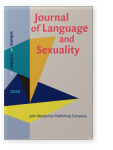Vol. 1:1 (2012) ► pp.59–78
Code-Swishing
This article is based on retrospective life history interviews with Dominican gay and bisexual immigrant men who live or have lived in New York City. It offers an alternative to established and influential interpretations of queer subject constitution that overemphasize abjection while ignoring the polyvalence of identities. Through an engagement with the conditions that make the figure of la loca [the effeminate homosexual] instrumental in the expression of closeness and intimacy among the men with whom I spoke, the article analyzes the way this signifier operates in the making and regulation of networks of self-identified Dominican gay and bisexual men. It conceptualizes “code swishing,” borrowing from scholarship on bilingualism and “code switching.” But it revises this work to implicate the body and gender dissent as communicative practices and to make clear that these men juggled their desire to establish and sustain networks with one another so long as expressions of camaraderie and connection did not threaten their legitimacy in daily life and their investments in normative masculinity. For them, surviving and being respected was more important than any sense of “community” they may have felt toward one another.
Cited by (2)
Cited by 2 other publications
This list is based on CrossRef data as of 5 july 2024. Please note that it may not be complete. Sources presented here have been supplied by the respective publishers. Any errors therein should be reported to them.
